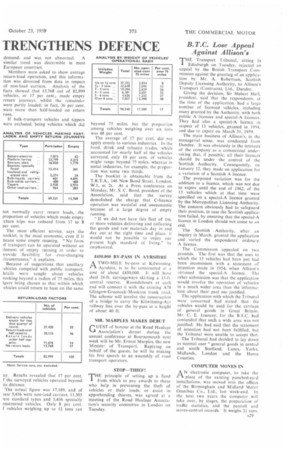B.T.C. Lose Appeal Against Allison's
Page 31

If you've noticed an error in this article please click here to report it so we can fix it.
THE Transport Tribunal, sitting in Edinburgh on Tuesday, rejected an appeal by the British Transport Commission against the granting of an ariplication by Mr. A. Robertson, Scottish Deputy Licensing Authority, to Allison's Transport (Contracts), Ltd., Dundee.
Giving the decision, Sir Hubert Hull, president, said that the respondents, at the time of the application, had a large number of licensed vehicles, including many granted by the Authority, with both public A licences and special-A licences. They had also a special-A licence in respect of 13 vehicles, granted in 1954, and due to expire on March 31, 1959.
The main business of Allison's, in the managerial sense, was conducted from Dundee. It was obviously in the interests of the company as a commercial undertaking that, if possible, all their licences should be under the control of the Scottish Authority. Consequently, on January 12, they made an application for a variation of a Scottish A licence.
The proposed variation was for the addition to a licence, which was not due to expire until the end of 1962, of the 13 vehicles which at that time were specified on a special-A licence granted by the Metropolitan Licensing Authority. The concern obviously had to safeguard their position, in case the Scottish application failed, by ensuring that the special-A licence in London should not come to an end.
The Scottish Authority, after an inquiry in March, granted the application and varied the respondents' ordinary A licence.
The Commission appealed on two grounds. The first was that the uses to which the 13 vehicles had been put had been inconsistent with a statement of intention made in 1954, when Allison's obtained the special-A licence. The other submission was that the application would involve the operation of vehicles in a much wider area than the information about their past use justified.
The application with which the Tribunal were concerned had stated that the vehicles would be used for the carriage of general goods in Great Britain. Mr. C. E. Jauncey, for the B.T.C. had contended that such a wide area was not justified. He had said that the statement of intention had not been fulfilled, but the Tribunal were unable to accept that.
The Tribunal had decided to lay down as normal user " general goods in central and south Scotland, Lancs, Yorks, Midlands, I.ondon and the Home Counties.
COMPUTER MOVES IN
AN electronic computer, to take the place of the existing punched-card installations, was moved into the offices of the Birmingham and Midland Motor Omnibus Co., Ltd., last week-end. In the next two years the computer will take over, by stages, the preparation of traffic statistics, and the payroll and stores-control records. It weighs 21 tons.




































































































